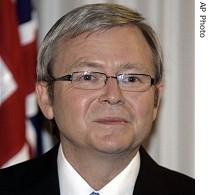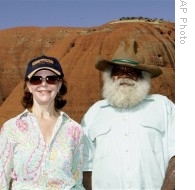VOA标准英语2008年-Government to Continue With Controversial Inter
搜索关注在线英语听力室公众号:tingroom,领取免费英语资料大礼包。
(单词翻译)
By Phil Mercer
Sydney
22 June 2008
Australia's Labor1 government has promised to maintain a controversial policy aimed at protecting Aboriginal2 children in remote settlements, a year after police and troops were sent into indigenous3 camps. Aborigines have demonstrated against what they've described as "racist4" policies. Community leaders have threatened to close Uluru, one of Australia's most popular tourist destinations, in protest. From Sydney, Phil Mercer reports.
 |
| Prime Minister Kevin Rudd |
A year ago Australia's former conservative government embarked5 on a controversial
plan to tackle the country's worst social problem. Chronic6 disadvantage had seen Aboriginal life expectancy7 fall to 17 years below that of other Australians. In response
to a damning report about widespread child abuse, troops, police officers and medical teams were sent to more than 70 indigenous communities in the Northern Territory.
Bans on alcohol and pornography were also introduced.
The policy has the support of the new Labor Prime Minister, Kevin Rudd.
12 months after the intervention8 began Aborigines across the country have demonstrated against what they've claimed are racist and draconian9 measures.
In protest tribal10 leaders from Central Australia have threatened to ban tourists from climbing Uluru, formerly11 known as Ayers Rock, a giant sandstone rock in Australia's
rugged red centre and is managed by its traditional Aboriginal owners.
Community elders have insisted that Aboriginal men had been portrayed12 as violent alcoholics13, who beat women and abuse children.
Critics of the policy have said that young Aborigines were still vulnerable to sexual assault despite the intervention.
 |
| Swedish Queen Silvia, left,talks with an aboriginal elder Reggie Uluru at Walpa Gauge14 in Australia (File) |
However, some Aboriginal community leaders believe that parts of the government's action plan are working, including the strict controls on the way that individuals could spend Centrelink, or welfare, payments to prevent family budgets being wasted on alcohol.
"We all have family members who have alcohol problems and I've seen the difference in my own immediate15 family where, with this income management now that they're
only spending half of their money on alcohol and gambling16 and the other half they've actually got food on the table because it's being managed by Centrelink [government
benefit department]. And for families like that I think it is a good thing," Said Helen Kantawarra, president of the Central Australian Aboriginal Congress.
Ministers have stressed that while there was still much work to be done, progress had been made. Basic health care was being provided and an increasing number of
Aboriginal children had been encouraged to go to school.
Kevin Rudd said the reforms had made a significant difference to thousands of lives.
Aborigines comprise about 2% of Australia's population of 21 million.
Many indigenous communities are self-destructing through the abuse of alcohol and drugs, which have left a terrible legacy17 of poverty, high unemployment and premature
death.
 收听单词发音
收听单词发音 




